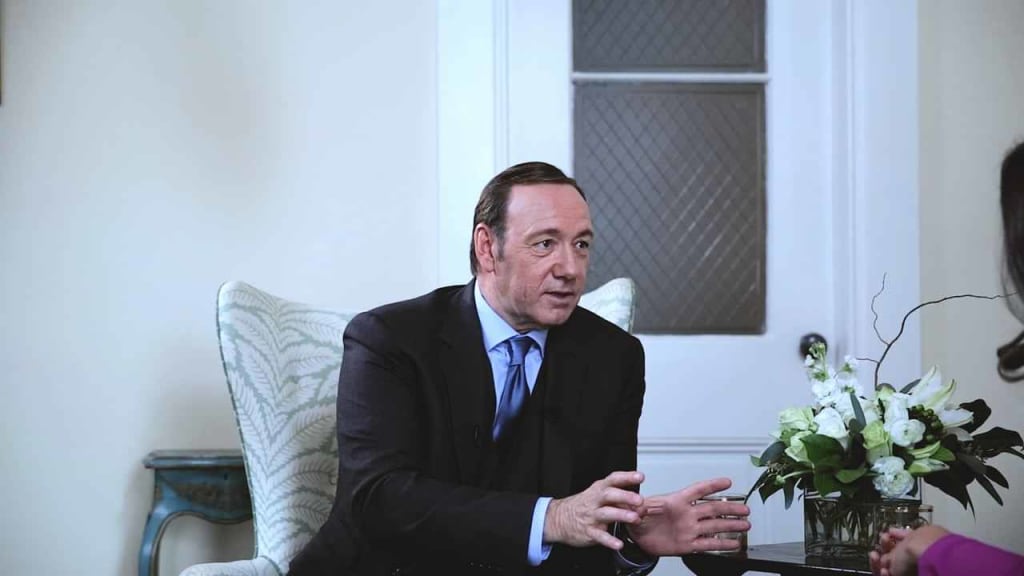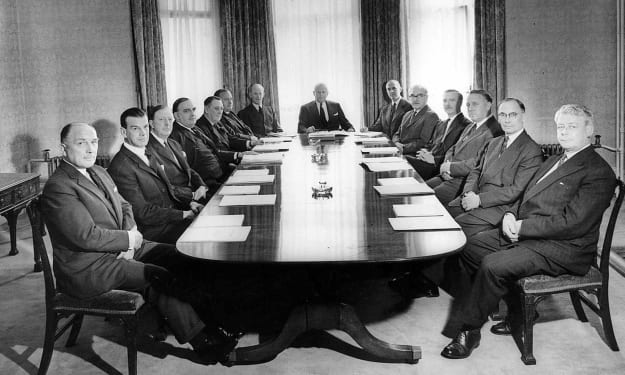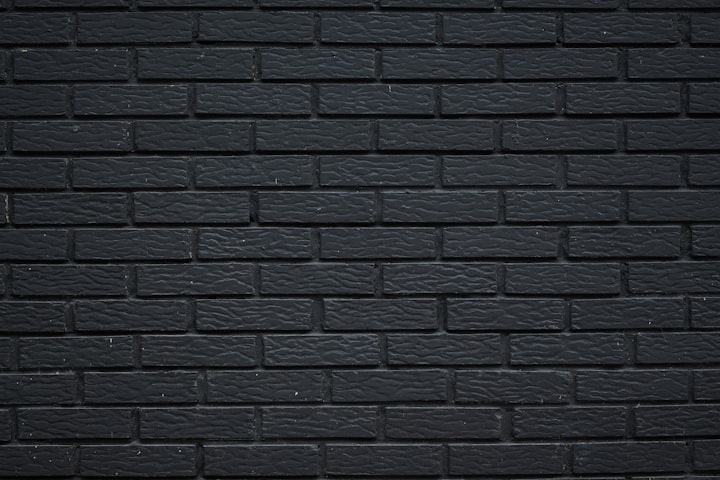We Need to Talk About Kevin (Spacey)
We can all learn to be better from his poor example.

The news broke this week over Kevin Spacey coming out… as both a sexual harasser and as a gay man. It’s finally (finally!) open season on sexual predators, so understandably everyone is mighty pissed off — not just because of this transgression, but because it seems that his coming out is designed to excuse or minimise it. It’s not a great look — LGBT people have put up with decades of abuse comparing them with child molesters and perverts, and this statement is sadly going to get all sorts crawling out of the woodwork.
I grew up in an extremely conservative and egregiously homophobic family. It was so extreme that whenever there was any hint or mention of homosexuality in the media (e.g. plotlines in soaps), my dad would be sure to announce loudly and threateningly that homosexuality was an aberration and that “that sort of thing” shouldn’t be allowed on TV (or at all). The real scandal in that home is going to be that someone else in the public eye is gay — not that the individual propositioned a child — or that it might have happened because of his sexuality.
Kevin Spacey appears to have tried to do the right thing, but it came across in the worst possible way. Here is the statement, which you’ve probably seen elsewhere on the internet by now, but anyway:
"I have a lot of respect and admiration for Anthony Rapp as an actor. I'm beyond horrified to hear his story. I honestly do not remember the encounter, it would have been over 30 years ago. But if I did behave as he describes, I owe him the sincerest apology for what would have been deeply inappropriate drunken behaviour, and I am sorry for the feelings he describes having carried with him all these years.
"This story has encouraged me to address other things about my life. I know that there are stories out there about me and that some have been fuelled by the fact that I have been so protective of my privacy. As those closest to me know, in my life I have had relationships with both men and women. I have loved and had romantic encounters with men throughout my life, and I choose now to live as a gay man. I want to deal with this honestly and openly and that starts with examining my own behaviour.”
He could have stopped at the end of the first paragraph, but for some reason he kept on going. I don’t know if he consulted a lawyer, or an adviser, or what, but the second half of that statement was a huge mistake. I do understand why he might have felt it was a good idea; the allegation would have fed ambiguity around his sexuality, and perhaps he felt that by spelling it out clearly, he was avoiding an even worse backlash. Well, that isn’t how it played out. This kind of statement might have worked in the 80s or 90s, when being openly gay was more dangerous — and a statement worded as if it had been given under duress might be more understandable back then. But in 2017, it’s not appropriate. Sure, the newspapers have gone down the route of picking up on the fact he is gay, but they would have done this anyway, and it would be a lot easier for us to criticise and condemn them for ignoring the real issue if they had done this based on an inference, rather than the obvious distraction handed to them on a plate by Spacey’s admission.
What about the actual apology — is that good enough? To give him credit, he hasn’t gone on the defensive, or pretended it never happened — in spite of him claiming not to remember, he has taken ownership of the allegation. Not remembering it (if that is the case) doesn’t mean that it didn’t happen or that it is any less serious. We so frequently hear of victims being quizzed and admonished for their drinking habits, and we focus so much attention on telling people not to drink in case they are targeted for rape or sexual assault. Of course, people should be free to get absolutely blind drunk and stagger home naked, without a predator seeing it as an opportunity to attack. But we rarely look at the other side of this problem — that when drunk, people’s inhibitions can be lowered in such a way that they might behave too aggressively, not have a very good filter, or refuse to hear the word “no.” Instead of focusing on victims’ alcohol consumption, we need to look at that of potential perpetrators.
There is a lot of chatter at the moment about “witch-hunts” against men, which surfaces every time someone famous is exposed for potential sexual offences. This belief has existed for decades — in the 1970s it was common to assume that women and child rape victims were liars out for attention, and that smacking one’s secretary on the arse was just one of the perks of the job. However, those attitudes have been carried through to more enlightened times, even though we publicly denounce the behaviour (we still have a long way to go). Instead of covering up, minimising, and denying the testimonies of victims, the conversation needs to shift towards ensuring that we do not support or become perpetrators ourselves.
It might be completely true that a perpetrator doesn’t remember carrying out an assault. They may be shocked to hear the accusation, and others may agree that it is completely out-of-character for them. But all of these things can be true, and the assault can still have happened. It happened to me. I was at a house party during my university days, the type of party that is a monument to youthful excess. There was not one sober individual in the room, and we liked it that way. At some point in the early hours, those of us who hadn’t staggered home collapsed on whatever soft furnishings were available to scratch a couple of hours’ sleep. I was awoken by one of our friend group completely nude, drunk, and assaulting me. I got up and did a runner, risking the walk home through a dodgy estate at 4 AM. I told a few people about it in the following days, and word got back to my assailant — who was very confused about the whole thing. They said they had no idea why they woke up naked, and they had no memory of what I described. And I believed them. That doesn’t make it any easier — it strained things within our social circle, and I felt uncomfortable around that individual for years. I find it troubling that I’m the only one with any recollection of this, and that it was just business as usual for everyone else.
What it does show is that good people can do bad things, and we need to acknowledge this both individually and as a society. We need to (as stated by Spacey) examine our own behaviour and consider if our actions may cause harm to another. There is a ridiculous pushback against the idea of personal responsibility at the moment, driven by an entitled culture of assuming that we are always right, leading to victim blaming and shaming. Instead of placing the burden on people to avoid being the victims of assault, we need to be mindful of our own behaviour and other people’s boundaries. Drunkenness is never an excuse for sexual assault. And if it’s clear that something has happened, but no-one is really sure what, we need to deal with the issue sensitively and appropriately, and support the victim.
All of these intertwined threads are part of the process of growing as a human being. There are no monsters, and no perfect victims. We are all just people, capable of good or ill. Things that once seemed acceptable (even though they weren’t) may come back to haunt us. But when we screw up, we need to own it. Admitting our mistakes and wrongdoing takes courage and humility, whereas denial and stereotyping only requires complacency and cowardice. It is good to see Kevin Spacey take responsibility, albeit in a backhanded sort of way. But it’s a terrible shame that it took three decades of silence and a deflection via his self-declared sexuality before he did. Amidst all these revelations about celebrities’ grim pasts, I hope that we can see it as an opportunity to improve ourselves and our moral landscape, to prevent such things from happening again.
About the Creator
Katy Preen
Research scientist, author & artist based in Manchester, UK. Strident feminist, SJW, proudly working-class.






Comments
There are no comments for this story
Be the first to respond and start the conversation.